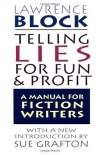Manual For Fiction Writers by Block, Lawrence (classic books to read .TXT) 📗

Book online «Manual For Fiction Writers by Block, Lawrence (classic books to read .TXT) 📗». Author Block, Lawrence
It's hard enough to write a novel and make it work. Projecting an entire series merely dilutes your efforts. Stay in the now, work on the book you're working on, and leave the question of future books open until you've finished the job.
2. SOME BOOKS USE UP THEIR LEAD CHARACTERS. The strength and appeal of a character is not in and of itself reason to hang a series on him. Such Men Are Dangerous (written under the pen name Paul Kavanagh) is arguably my best book, and had as strong a lead character as I've created. But the book used him up, not in the sense of killing him off but in that he completed his business by its end. Hollywood of late has been making sequels of everything that does well at the box office, and the lamentable quality of most of these sequels shows the fallacy of this principle. If your lead character is sufficiently altered by what he has experienced, you can't put him in another book and make him do the same thing over again without losing something. In my own experience, I had to jam Chip Harrison into a detective series so that he would not be used up.
3. DON'T PRESUME THE READER HAS READ THE PREVIOUS VOLUMES. The sixth book you write about Private Eye Studd Boring will be some reader's introduction to your hero. You can't take prior knowledge for granted. On the other hand, you don't have to reiterate every single fact you've established about your hero in the course of all of the earlier books. There's a delicate balance here. You want to make things fully comprehensible for the new reader without boring the jaw teeth out of your longtime fans. For my own part, I've grown tired of hearing again how Meyer Meyer got his name and lost all his hair; every Ed McBain 87th Precinct novel tells me the story over again. My own readers may be every bit as tired reading about how a bullet of Scudder's ricocheted to kill Estrellita Rivera and plunge my hero into the Slough of Despond. A delicate balance indeed.
4. REMEMBER WHAT YOU WROTE. The maddening thing about writing a series over a period of years is keeping track of what you established about your characters and their friends and relations in earlier books. What floor does Tanner live on? What's the name of Carolyn Kaiser's lover's aunt in Bath Beach? Or did we establish that the aunt lived in Bensonhurst? What's the name of the bar where Chip likes to watch the Mets game? That hooker Elaine whom Scudder pals around with?what's her last name? And that tie Ehrengraf always wears at triumphal moments?it's the official cravat of the Caedmon Society, but what's the color combination?
Some writers let the chips fall where they may. Rex Stout furnished any number of street numbers over the years for Nero Wolfe's 35th Street brownstone, and sprinkled the books with a multitude of other minor inconsistencies. I myself am sufficiently obsessive-compulsive to make every effort to avoid that sort of thing, and the only way I've found is to stop writing and start paging through my collected works. Arthur Maling has a chart with all the characters and their interrelationships in his Price, Potter and Petacque series. If I had such a chart, I'd doubtless fail to keep it up to date?or I'd always find myself needing to know some minor point I hadn't bothered entering in the first place.
5. THE FIRST-PERSON/THIRD-PERSON CHOICE. Of my series characters, all but Ehrengraf speak in the first person. That doesn't mean this is the right way to do it. As a rule of thumb, I would suggest that larger-than-life characters like James Bond, Sherlock Holmes, and Nero Wolfe are more effectively handled either via third-person narration or with the aid of a Watson?i.e., a first-person narrator other than the lead character. Direct first-person narration is more likely to work when the writer identifies strongly with the lead character and wants to write from the inside out, showing the world through his character's eyes. But whatever comes most naturally to you as a writer is probably the best choice.
Much of my most enjoyable hours at the typewriter have been spent in the company of one or another of my series characters. And, when a series seems to have run its natural course, I'm not without a pang of regret, as though I've abandoned an old friend by ceasing to write about him. I'm grateful that my writing career has not been so rigid, glad I've not spent the past fifteen years writing nothing but Tanner books?and yet I sometimes feel guilty for having cast him aside like a tattered shirt.
Is the series for you? You'll find out?a book at a time, over the years. Enjoy it.
CHAPTER 46
We Can Always Change the Title
ONCE UPON a time, many long years ago, a woman wrote a novel of the Civil War and called it Tomorrow Is Another Day. By the time the book saw print its title had been changed at the publisher's suggestion. The new title was Gone With the Wind.
The clarity of hindsight is never more vivid than when dealing with titles. It's a simple matter now to argue that Margaret





Comments (0)